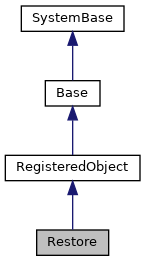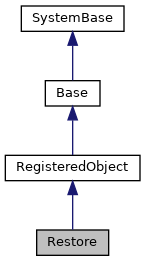Example 1 (Restore everything in selected journal files of current InterSystems IRIS instance): s RestOref=##class(Journal.Restore). More...


Public Member Functions | |
| _.Library.Status | CheckJournalIntegrity (_.Library.Integer Scan) |
| To check the selected journal files for problems (missing files, corruptions, etc.) More... | |
| _.Library.Status | RedirectDatabase (_.Library.String SourceDatabase, _.Library.String TargetDatabase) |
| Set up journal restore to apply updates of SourceDatabase to TargetDatabase. More... | |
| _.Library.Status | Run () |
| To run journal restore. | |
| _.Library.Status | SelectUpdates (_.Library.String SourceDatabase, _.Library.String GlobalName) |
| To select a database or a global in a database to restore More... | |
| _.Library.Status | UseJournalLocation (_.Library.SysPath JournalDirectory) |
| Set up <property>JournalLocation</property> | |
Public Attributes | |
| AbortOnDatabaseError | |
| Whether to abort journal restore if an update would have to be skipped due to a database-related problem (e.g., a target database cannot be mounted, error applying an update, etc.). More... | |
| AbortOnJournalError | |
| whether to abort journal restore if an update would have to be skipped due to a More... | |
| DisableJournaling | |
| Whether to disable journaling of the applied updates (for performance purpose) More... | |
| Dismount | |
| To dismount databases whose updates were skipped due to errors. More... | |
| Filter | |
| Specify a filter routine such as "^ZJRNFILT" to apply to every selected updates during journal restore. More... | |
| FirstFile | |
| The first journal file to process. More... | |
| JournalLocation | |
| A list of directories where the selected journal files are located More... | |
| JournalLog | |
| Path of a journal history log where the selected journal files are listed More... | |
| LastFile | |
| The last journal file to process More... | |
| MarkerTrigger | |
| Specify a routine (or tag) such as "MARKER^ZJRNFILT" to be invoked on journal markers during journal restore. More... | |
| RollBack | |
| To roll back incomplete transactions at the end of journal restore. More... | |
| SourceDatabases | |
| A list of database directories stored in the selected journal files. More... | |
| StartPosition | |
| The position of the first journal file to begin processing at. More... | |
| SwitchOnCurrentJournal | |
| If current journal file is among the journal files selected to be processed,. More... | |
Static Public Attributes | |
| TYPE = None | |
| This corresponds to the fromrest parameter in journal restore utility. More... | |
Private Attributes | |
| __DatabaseRedirection | |
| An array of SourceDatabase -> TargetDatabase for database redirection More... | |
| __SelectedFiles | |
| A list of selected journal files in their current location. More... | |
| __SelectedUpdates | |
| A table of (SourceDatabase,GlobalName) selected to be restored More... | |
| __StartTime | |
| More... | |
| __zsvalsav | |
| Original value of $ZSTORAGE to be restored upon close. More... | |
Example 1 (Restore everything in selected journal files of current InterSystems IRIS instance):
s RestOref=##class(Journal.Restore).
New() s RestOref.FirstFile="20100107.001" s RestOref.LastFile="20100107.002" s Status=RestOref.Run()
Example 2 (Restore selected globals in selected databases from foreign journal files):
s RestOref=##class(Journal.Restore).New() s RestOref.FirstFile="/another_system/20100107.001" ;copied from another InterSystems IRIS instance s RestOref.LastFile="/another_system/20100107.002" ;copied from another InterSystems IRIS instance s RestOref.JournalLog="/another_system/journal.log" ;copied from another InterSystems IRIS instance d RestOref.UseJournalLocation("/another_system") ;and so on (where to locate journal files) s Status=RestOref.CheckJournalIntegrity(1) ;to populate property 'SourceDatabases' with database paths collected from the journal files to be restored s key="" for { s SourceDatabase=RestOref.SourceDatabases.GetNext(.key) q:key="" w !,SourceDatabase," => " r TargetDatabase s Status=RestOref.RedirectDatabase(SourceDatabase,TargetDatabase) s Status=RestOref.SelectUpdates(SourceDatabase,GlobalName1) s Status=RestOref.SelectUpdates(SourceDatabase,GlobalName2) ;and so on } s Status=RestOref.Run()
| _.Library.Status CheckJournalIntegrity | ( | _.Library.Integer | Scan | ) |
To check the selected journal files for problems (missing files, corruptions, etc.)
Scan
| _.Library.Status RedirectDatabase | ( | _.Library.String | SourceDatabase, |
| _.Library.String | TargetDatabase | ||
| ) |
Set up journal restore to apply updates of SourceDatabase to TargetDatabase.
instead of SourceDatabase itself.
Note that for database redirection to take effect, you must also call SelectUpdates() for each database to be restored, even if you intend to have all databases restored.
This method can be called before or after the SelectUpdates() calls.
See <method>SelectUpdates</method> on how to ensure the SourceDatabase argument is in a proper form.
| _.Library.Status SelectUpdates | ( | _.Library.String | SourceDatabase, |
| _.Library.String | GlobalName | ||
| ) |
To select a database or a global in a database to restore
If GlobalName is not specified, all globals in SourceDatabase will be restored, unless you also call SelectUpdates(SourceDatabase,GlobalName) (before or after the call without GlobalName), in which case only the specified global(s) are restored.
GlobalName must begin with an alpha, "%", "*" or "?", followed by alphanumerics and "*?."s ("." for dot syntax).
You must make sure the 'SourceDatabase' argument is in the canonical form acceptable to journal restore. One way to ensure that is illustrated in Example 2 at the beginning of the class document, that is, by calling <method>CheckJournalIntegrity</method> with 1 to have <property>SourceDatabases</property> populated with database paths collected from the journal files to be restored.
|
static |
This corresponds to the fromrest parameter in journal restore utility.
fromrest is set by the caller of journal restore utility to indicate the type of journal restore (or the type of the caller). For example, ^JCONVERT sets fromrest=8 to instructs journal restore to write out the updates to a file instead of applying them to databases. Some types of restore have their own parameters (e.g., the path of an output file for fromrest=8), so a subclass for each type seems logical.
^JRNRESTO sets fromrest=0, which is the default here.
| AbortOnDatabaseError |
Whether to abort journal restore if an update would have to be skipped due to a database-related problem (e.g., a target database cannot be mounted, error applying an update, etc.).
If journal restore is aborted, databases will be left in a self-consistent state as of the record that caused the restore to be aborted. Parallel dejournaling will be disabled with this setting; otherwise, affected database(s) may not be self-consistent and will need to be recovered separately.
| AbortOnJournalError |
whether to abort journal restore if an update would have to be skipped due to a
journal-related problem (e.g., journal corruption, missing journal files, etc.)
|
private |
An array of SourceDatabase -> TargetDatabase for database redirection
If none specified, apply updates to the original databases
s JrnRestOref=##class(Journal.Restore).New() s Status=JrnRestOref.RedirectDatabase(SourceDatabase,TargetDatabase)
| DisableJournaling |
Whether to disable journaling of the applied updates (for performance purpose)
| Dismount |
To dismount databases whose updates were skipped due to errors.
| Filter |
Specify a filter routine such as "^ZJRNFILT" to apply to every selected updates during journal restore.
| FirstFile |
The first journal file to process.
| JournalLocation |
A list of directories where the selected journal files are located
Required if <property>JournalLog</property> has a non-default value.
| JournalLog |
Path of a journal history log where the selected journal files are listed
Default: the journal history log of local InterSystems IRIS instance.
Set JournalLog=-1 to override the default without specifying a journal log.
| LastFile |
The last journal file to process
Default: the last journal file listed in the journal history log given by <property>JournalLog</property>
| MarkerTrigger |
Specify a routine (or tag) such as "MARKER^ZJRNFILT" to be invoked on journal markers during journal restore.
| RollBack |
To roll back incomplete transactions at the end of journal restore.
|
private |
A list of selected journal files in their current location.
|
private |
A table of (SourceDatabase,GlobalName) selected to be restored
If none specified, restore everything from the selected journal files
s JrnRestOref=##class(Journal.Restore).New() s Status=JrnRestOref.SelectUpdates(SourceDatabase,GlobalName)
| SourceDatabases |
A list of database directories stored in the selected journal files.
for verifying the source database directories given in the <property>DatabaseRedirection</property> property if specified
| StartPosition |
The position of the first journal file to begin processing at.
|
private |
| SwitchOnCurrentJournal |
If current journal file is among the journal files selected to be processed,.
the user has an option to switch journal file or stop journaling system wide.
This is necessary if <property>DisableJournaling</property> is NO, as otherwise the applied updates will be journaled in the file that will be dejournaled, resulting in data integrity issues.
Even if <property>DisableJournaling</property> is YES, it is still a good practice to switch journal file so that new updates will go into the new file.
|
private |
Original value of $ZSTORAGE to be restored upon close.